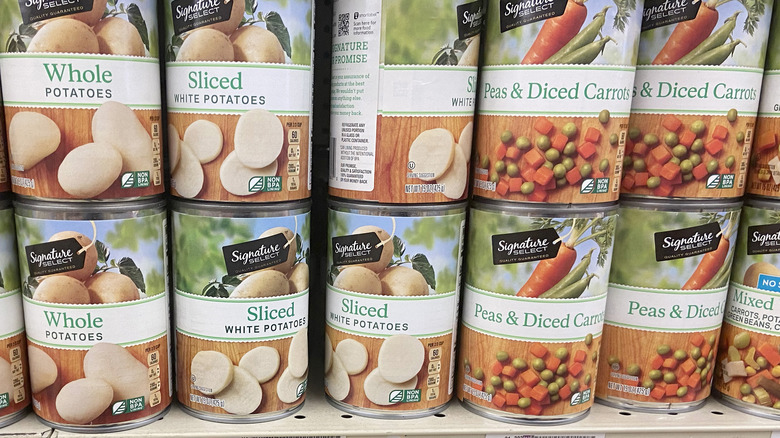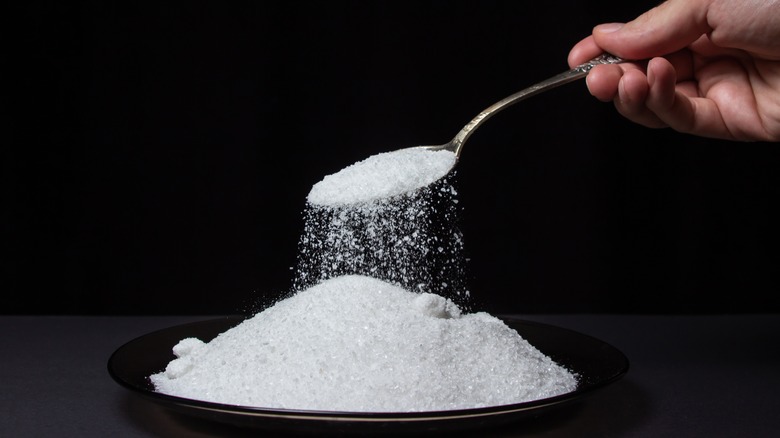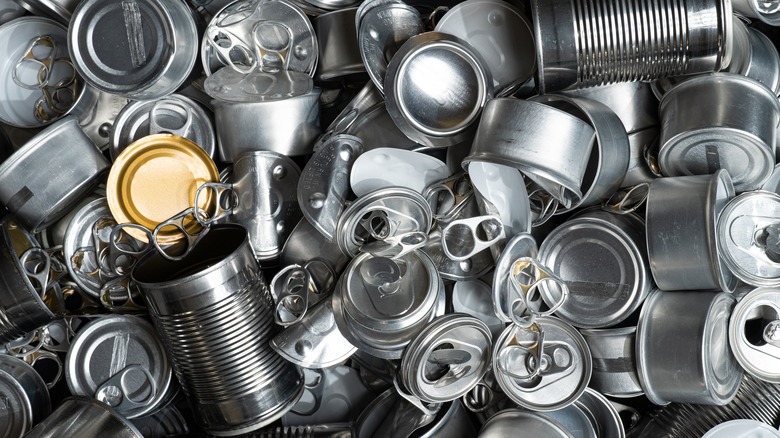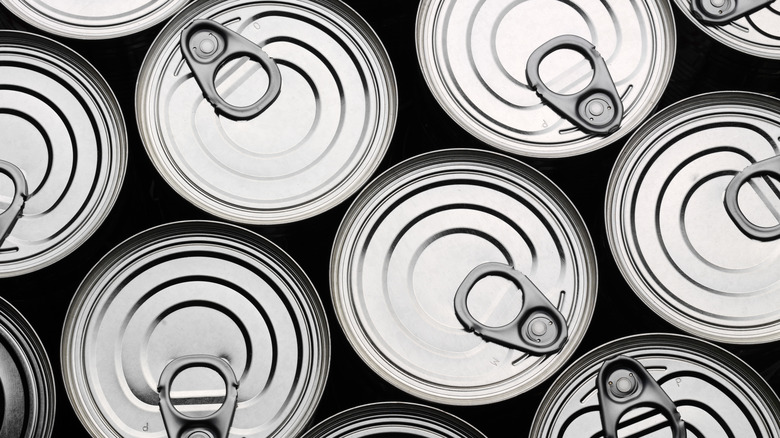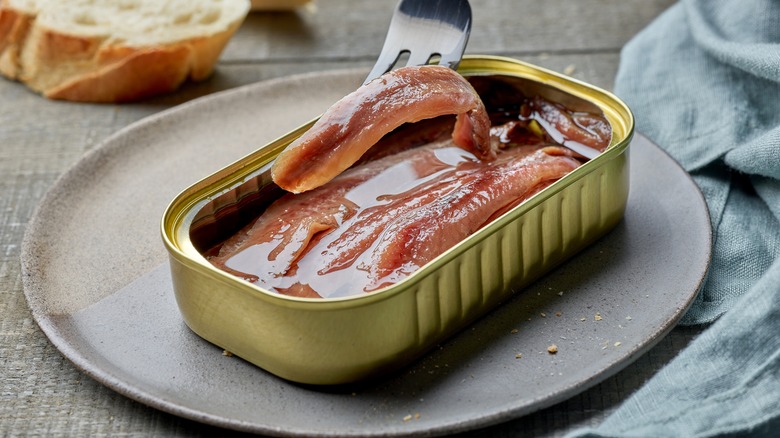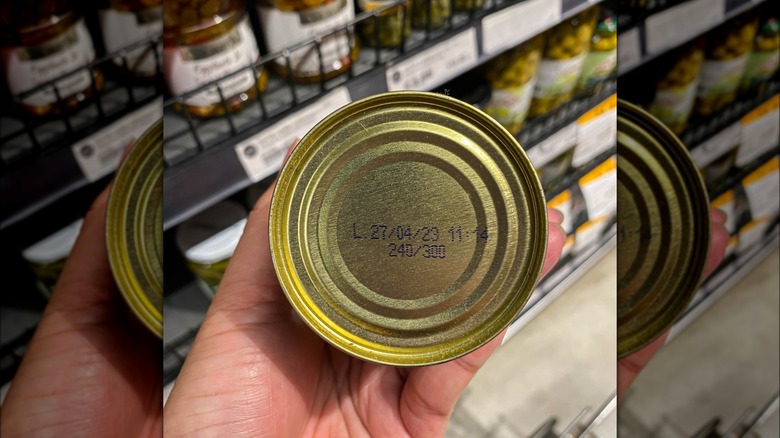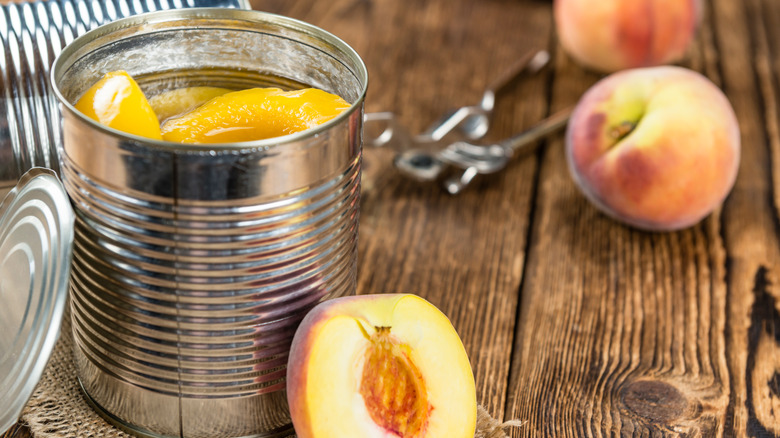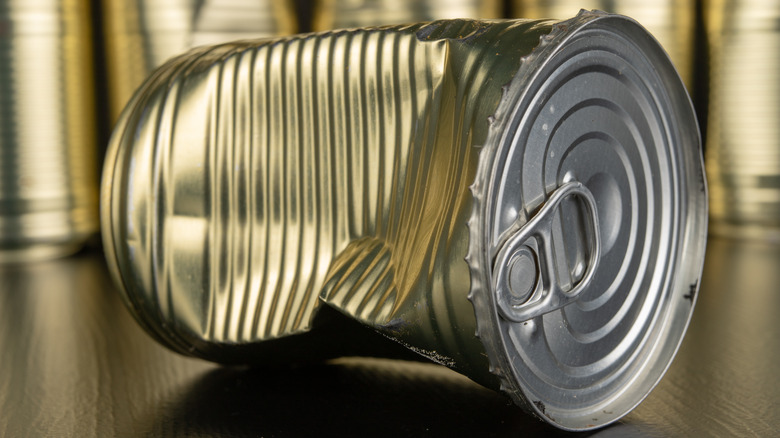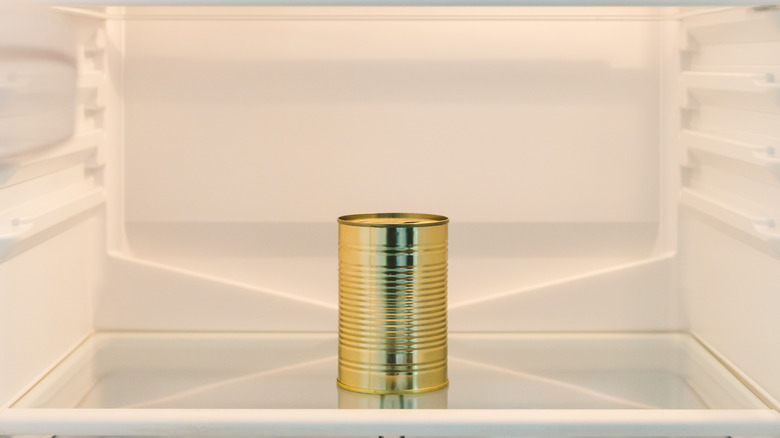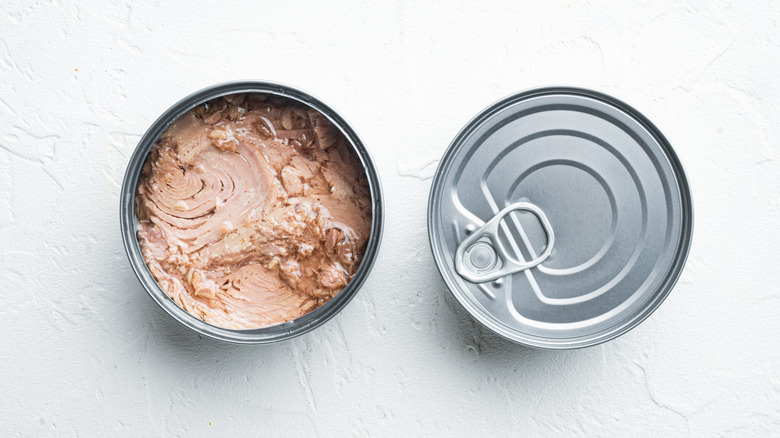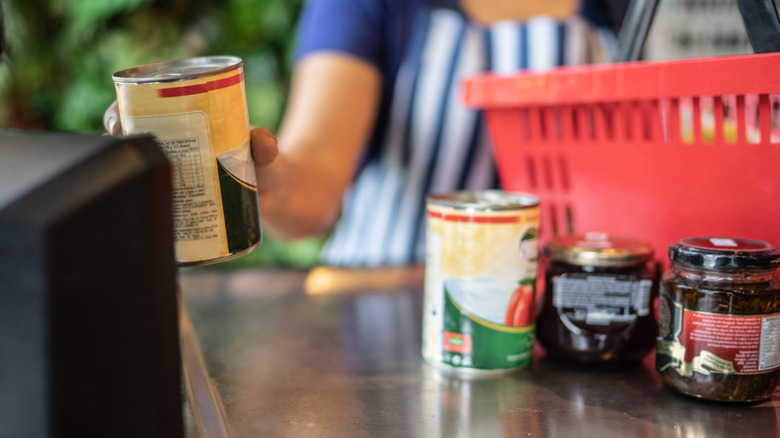11 Canned Food Myths You've Probably Fallen For At Some Point
Canned food is everywhere and has been for a long time. Since the invention of canning in early 19th century France, which came about as a response to a public plea from the government to figure out a way to make army supplies last longer, the food preservation technique has remained popular. Nowadays, the size of the canned food industry has reached almost gargantuan proportions.
Virtually every kitchen in the country has cans of tomatoes, soups, vegetables, and pie fillings stashed away in a cupboard, with some foods, like tuna fish, being primarily accessed in their canned form. With all those cans, though, come a lot of questions. Most of us don't think twice about using canned food, but most of us also don't think twice about believing the myths that we've picked up along the way about it. If you've ever heard, for example, that putting an open can of food in the fridge can give you food poisoning, or that canned food stays fresh forever, you're likely not alone. It's myths like this, however, that we're determined to put right, once and for all.
1. Myth: Canned food has no nutritional value
The overriding assumption about canned food is that it's somehow less nutritious than its fresh counterparts, or else is lacking in nutritional value entirely. While this might be true for more processed versions of canned food, for the most part, this couldn't be further from the truth. When it comes to canned fruits and vegetables, for instance, their nutrient levels are often pretty similar to a fresh or frozen version of the same item. Incredibly, in a point for canned food in the canned vs frozen food debate, canned foods can sometimes contain higher levels of nutrients than frozen foods, as well as fresh ones. Canned tomatoes, for example, have been found to be higher in antioxidants than fresh ones due to the heating process they undergo when preserved.
The fresh food items that end up in your cans are picked and processed when they're at their freshest. When they're then canned, this freshness, and all the nutrients that are present, are locked straight in the metal container. As such, you really shouldn't worry about your nutritional intake from canned foods, unless you're eating items that have added sodium, sugar, or preservatives. A study published in the journal Nutrients found that people who ate canned foods more frequently had an overall intake of essential nutrients when compared to people who didn't eat canned goods as often.
2. Myth: Canned foods are always high in sodium
Because canned foods go through a preservation process, it's often assumed that they'll be crammed full of ingredients that help them last longer — like sodium. However, that isn't always the case. Many major retailers and brands sell no-salt-added or low-sodium versions of canned foods in a bid to make their products even healthier. These lower-sodium options are often the same price as their salt-containing counterparts, too, meaning that the only thing you lose by buying them is saltiness (which you can always add to your meal at a later point).
Importantly, though, there are some pretty unhealthy store-bought canned foods out there that are shockingly high in sodium, so you must always check the nutritional label. This is usually the case with more processed foods, where sodium is added for flavor as well as longevity, like with canned soups. Canned vegetables can also have noticeably high sodium levels, depending on the brand you choose. If you discover upon getting home from the store that the can of beans you just picked up is full of salt, an easy way to reduce its sodium content is to rinse the produce under a running tap. While this may not get rid of all the sodium, it will help to diminish it somewhat and take the edge off your food's taste.
3. Myth: Buying canned foods is inherently wasteful
Buying canned food is often thought to come at a cost to the environment, and it's hard to argue against that. When you pick a can of vegetables over its fresh version, you're left with what to do with the metal container once it's been used, and this can seem to contribute to food waste. It's worth remembering, though, that as far as food packaging goes, you can do much worse than picking cans. Food cans are recycled more than any other type of food packaging in the United States, and provided it's done right, they can be reused and recycled into the production chain indefinitely.
Recycling aluminum cans is particularly beneficial to energy expenditure, with the energy cost of recycling aluminum far smaller than producing new cans from scratch. Despite this, there's still a long way to go. It's currently estimated that just over 45% of all aluminum cans are recycled in the USA, according to a report by Eunomia, and the goal is for that percentage to increase dramatically in the coming years. That's why it's always important to take an extra few seconds to check how to recycle your cans properly and adhere to your local rules so that every item you place in the recycling can be processed easily.
4. Myth: Canned foods have harmful chemicals in them
One of the biggest fears around buying canned foods is that you may be getting more than you bargain for ingredients-wise — and these worries aren't entirely unfounded. Since the 1960s, food cans have routinely been lined with a substance called BPA, a chemical used to reduce the metal's corrosion and the risk of the can itself breaking down, creating a barrier between the food and the metal. The issue is that the BPA used in these cans doesn't always stay put, and it's been found that it can leech into the food contained inside. Multiple studies have identified potential health risks associated with the consumption of BPA, with potential effects including brain and behavioral issues and heart conditions, as noted by WebMD, with children and infants being particularly susceptible.
Luckily, things are changing pretty quickly. Almost all of the food cans produced in the USA are now BPA-free, and instead use alternative linings to protect the products inside. These linings are specifically developed with people's health in mind, as well as for their ability to protect products from bacteria and prevent them from absorbing a metallic flavor from the can. If you're unsure about whether your canned foods contain BPA or not, take a look at the recycling information at the bottom. If you see the number "7" in the recycling symbol, accompanied by the word "OTHER," it could be a sign that it contains BPA.
5. Myth: Canned foods are never used by chefs
We're brought up to believe that fresh is always better, and so when we eat out, that's what we tend to expect. As a result, it can be easy to assume that the food coming out of your favorite kitchen has all been delivered that same day, with not a food can in sight. Things couldn't be further from the truth. Chefs commonly use canned food in their recipes, not just for their ease of use, but for the rich flavor they can immediately give a dish.
Canned fish like sardines and canned anchovies are particularly chef-approved, with the intensity they develop by being salted and canned far superior in many uses than their fresh flavors. Canned tomato paste, too, is a staple in restaurant kitchens around the world, and the base of countless pasta and pizza sauces. Chefs also routinely cut the hassle out of soaking dried beans and chickpeas by quickly opening up a can. Don't think that some of the best chefs out there aren't reaching for some unexpected canned goods, either -– like Spam. "Fry some up and make an egg and cheese sandwich. Or make fried rice or even drop some in a rich tomato sauce in place of fresh sausage," suggests Eastern Standard's former executive chef Nemo Bolin, via Food & Wine. Hey, if it's good enough for him, it's good enough for us!
6. Myth: Canned foods stay fresh forever
We've all seen those films and TV shows where a doomsday prepper shows off an impressive wall of canned food items in their underground bunker, designed to keep them fed long after the world ends. It might surprise you to learn, however, that this strategy might not quite work if you still want your food to taste good.
It's the case that canned food can, theoretically, stay safe to eat indefinitely, as long as the can is undamaged and remains closed. However, like any other type of food, canned food's quality will deteriorate over time, and you might find that the ravioli you were saving has turned to unpalatable mush. Canned foods can also lose their nutritional value over time, too, and eating them within their use-by date will ensure that you get the best bang for your buck from their nutrients.
Luckily, it can take a while for professionally canned foods to start diminishing in quality. As a general rule of thumb, more acidic foods will deteriorate faster, with canned tomatoes and pineapples potentially only staying fresh for up to 18 months; low-acid foods like vegetables, which will stay good for several years.
7. Myth: Canned foods are crammed with preservatives
Eating preservative-free foods can make us wholesome, and this sense of wholesomeness can feel a little incompatible with canned foods. After all, if a food item can last multiple years at room temperature without losing its taste or quality, then surely it has to have something added to it, right? In the case of canned foods, this isn't always true. Many canned items contain nothing but the food item in question and water, with added preservatives unnecessary, due to the canning process eliminating any microbes that could cause the food to go bad or deteriorate.
When foods are canned, they go through a heating stage. After the food is sealed inside the can, they are placed in cookers that heat them to a high temperature, destroying any bacteria. Once they cool, they're labeled and sent off to the stores. Importantly, some canned foods do contain certain preservatives, including common ones like sodium or sugar. These ingredients, however, are usually added to make the food taste better instead of killing any bacteria or making it last longer, so don't be alarmed if your item doesn't contain either — your food will still be good to go, provided that the can is intact.
8. Myth: You should never use dented cans
There's a lot of worry about using dented cans, and it makes sense. If your can becomes damaged or severely dented, it is more serious and can end up with holes in it that allow bacteria to seep into the food inside. When this happens, the previously safe food can start to go bad, raising the risk of it becoming unsafe to eat.
Luckily, though, not all dents will result in this, and it could still be safe to use a can that's lightly dented. If your can has any dents that are smaller than your finger and it's not compromised in any way, it could just be cosmetic damage, with the food inside still good to go. If, however, you can get your finger inside the dent, or the dent has sharp edges, then it may be the case that there's a hole in its exterior that could be allowing air in. The same goes for a dented rim — any damage to its outer edges means that you should throw away the can immediately.
You should also look out for signs of bulging. Bulging edges can indicate that bacteria has got inside the can, and could potentially indicate a sign of botulism. It's always better to just buy a new can, instead of risking it with one that could have been compromised.
9. Myth: Putting opened canned food in the fridge is dangerous
Whether it's safe to store open canned food in the refrigerator is a debate that's raged on for quite some time. If you're anything like us, you've probably heard that doing this may cause food poisoning. Well, we're not sure where this myth comes from, but we're proud to debunk it here.
The truth is that leaving canned foods in their original container and refrigerating them once opened is totally safe. It may not, however, produce the best taste for your food. "It's more about maintaining the quality and taste like you would for any other food you prepare. If you're making chicken, you're not going to store it in the pan," says Canned Food Alliance's communications manager Katie Toulouse, per Epicurious.
So, while we wouldn't recommend keeping your food in its can, it will do in a pinch. The best thing, though, is to transfer it to a clean metal or plastic container, so that its flavor isn't compromised. It's also important to remember that the fact that your food was once canned doesn't mean that it'll last longer once it's opened. You should consume any formerly canned goods within roughly four days, and watch out for signs of spoilage.
10. Myth: Canned food is low quality
It's tempting to assume that the best food is reserved to be served and eaten fresh, and anything inferior is kept for canning. While it's definitely true that there are some less attractive canned foods in the world, it's wrong to think that every canned item is of poor quality. Some of the highest-quality food items end up in cans, simply because doing so makes them last longer, allowing people to enjoy their delicious flavor in years to come.
This difference in quality is particularly apparent when it comes to canned fish, with varying degrees available that can differ significantly in taste. For tuna, for instance, you can opt for your standard can of albacore, or pick up some Ortiz Bonito Fillets in Olive Oil, an artisanal option that packs the rod-caught, hand-trimmed, super-flavorful protein into stylish cans. The same difference can be found with anchovies. A simple can of these salty fish can set you back a couple of dollars, or you can splurge on some Cantabrian anchovies processed by the Ramón Peña cannery, where their consistency is continually monitored by a local laboratory. So many options, so little time!
11. Myth: Store-bought canned food is always safe to eat
Canned food is often assumed to be a sure bet, and thanks to its extremely lengthy shelf life, most of us don't think twice about food safety when we're cracking it open. Contrary to popular belief, though, it's not always totally sanitary. While it's very uncommon, some commercially canned foods can become contaminated with bacteria, which can in certain circumstances result in botulism poisoning. A dangerous illness, botulism affects your nervous system, with nausea and vomiting, loss of motor function, and trouble breathing often occurring as symptoms, according to the Cleveland Clinic.
In certain situations and if left untreated, botulism can be fatal, and intervention with antitoxin medication is often required. It should be pointed out, though, that botulism from store-bought canned foods is very rare. It's way more likely to occur from home canned foods, which aren't subject to the same standards of sanitation that commercial production outfits are. Luckily, too, there will usually be some visual cues to your can that it's been compromised by botulism bacteria: Look out for any bulges, leaks, or dents that could provide an entry point for microbes.

